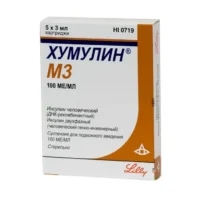Description
Diaformin (Metformin) Tablets 850 mg. №30
Ingredients
Each tablet contains 850 mg of metformin hydrochloride.
Mechanism of Action
Metformin, the active ingredient in Diaformin tablets, works by decreasing glucose production in the liver and improving insulin sensitivity in the body’s tissues. This dual mechanism helps to lower blood sugar levels and enhance the body’s response to insulin.
Pharmacological Properties
Metformin belongs to the biguanide class of medications. It reduces hepatic glucose production, decreases intestinal glucose absorption, and increases peripheral glucose uptake and utilization. Additionally, metformin has been shown to have beneficial effects on lipid metabolism.
Indications for Use
Diaformin tablets are indicated for the management of type 2 diabetes mellitus. They are used to help control blood sugar levels and reduce the risk of complications associated with diabetes, such as cardiovascular disease, neuropathy, and nephropathy.
Contraindications
Do not use Diaformin if you have severe kidney disease, metabolic acidosis, or a history of hypersensitivity to metformin. It is crucial to consult a healthcare provider before initiating treatment with Diaformin to assess the risk-benefit profile for individual patients.
Side Effects
Common side effects of Diaformin may include gastrointestinal symptoms such as nausea, vomiting, diarrhea, and abdominal discomfort. These side effects are usually mild and transient, resolving with continued use. In rare cases, lactic acidosis can occur, especially in patients with predisposing factors.
Usage Instructions
The usual starting dose of Diaformin is one 850 mg tablet taken orally once daily with food. Dosage adjustments may be made based on individual patient response and in consultation with a healthcare provider. The tablets should be swallowed whole with a full glass of water and should not be crushed or chewed.
Benefits Compared to Analogues
Diaformin, containing metformin as the active ingredient, offers several advantages over other antidiabetic medications. It has a well-established safety profile, is associated with weight neutrality or even weight loss, and has shown cardiovascular benefits in patients with type 2 diabetes.
Suitable Patient Groups
Diaformin is suitable for use in a wide range of patient populations, including adults, elderly individuals, and adolescents with type 2 diabetes. However, dosing adjustments may be necessary in patients with renal impairment or hepatic dysfunction.
Storage and Shelf Life
Store Diaformin tablets at room temperature away from moisture and heat. Keep the medication in its original packaging to protect it from light. Check the expiration date on the packaging and do not use the tablets if expired.
Packaging Description
Diaformin tablets are typically packaged in blister packs to ensure individual tablet integrity and facilitate easy daily dosing. Each pack contains 30 tablets of 850 mg strength.
Clinical Evidence and Proven Effectiveness
Metformin, the key component of Diaformin tablets, has been extensively studied for its efficacy in managing type 2 diabetes. Clinical studies have demonstrated that metformin therapy is associated with improved glycemic control, reduced cardiovascular risk, and overall mortality benefits in diabetic patients.
Research published in the American Diabetes Association’s Diabetes Care journal has highlighted the positive impact of metformin on cardiovascular outcomes and mortality reduction in individuals with type 2 diabetes. These findings underscore the importance of metformin as a cornerstone therapy in the management of diabetes.
Additional Information
Patient adherence to the prescribed treatment regimen and regular monitoring of blood glucose levels are essential for the optimal management of diabetes with Diaformin. Any concerns or side effects should be promptly reported to a healthcare provider for appropriate evaluation and management.
Before making any changes to your diabetes treatment plan or initiating new medications alongside Diaformin, consult with your healthcare provider for personalized guidance. Lifestyle modifications, including a healthy diet and regular exercise, play a crucial role in achieving successful outcomes in diabetes management.





